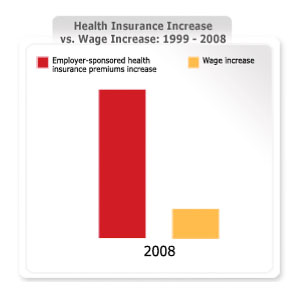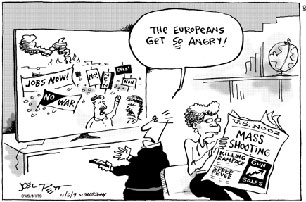
Against ConsensusWhy the most politically radical health care solution is also the most fiscally conservative.
Posted Friday, April 10, 2009, at 6:16 PM ETPlease take a minute out of whatever you're doing to look at this bar graph:
 Stunning, isn't it? What this demonstrates is that even before the bottom fell out of the economy, almost nobody in the United States got a real raise during the Bush years. Between 1999 and 2008, employer-sponsored health insurance premiums increased six times faster than wages. Average employer contributions to family health care plans more than doubled, and so did average worker contributions to those plans. Whatever pay increases the average worker received were wiped out, and then some, by the rapidly growing amounts deducted from his paycheck to cover health insurance. That's assuming he was lucky enough to be among the 59 percent of the U.S. population that received employment-based health insurance. (Fifteen percent have no health insurance at all. The other 26 percent either buy their own health insurance or get it through government programs like Medicare and Medicaid.) These calculations don't take into account the rising cost of actually using ever-pricier health coverage. During the same period, deductibles tripled.
Stunning, isn't it? What this demonstrates is that even before the bottom fell out of the economy, almost nobody in the United States got a real raise during the Bush years. Between 1999 and 2008, employer-sponsored health insurance premiums increased six times faster than wages. Average employer contributions to family health care plans more than doubled, and so did average worker contributions to those plans. Whatever pay increases the average worker received were wiped out, and then some, by the rapidly growing amounts deducted from his paycheck to cover health insurance. That's assuming he was lucky enough to be among the 59 percent of the U.S. population that received employment-based health insurance. (Fifteen percent have no health insurance at all. The other 26 percent either buy their own health insurance or get it through government programs like Medicare and Medicaid.) These calculations don't take into account the rising cost of actually using ever-pricier health coverage. During the same period, deductibles tripled.
Health care costs have spiraled out of control. That, in a nutshell, is why Congress and the Obama administration must enact health care reform.
Now consider the following calculations, from an April 6 study by the Lewin Group, a private health care research-and-consulting firm in Falls Church, Va. If, as part of health care reform, the federal government were to create a new health insurance program to compete with private insurers—as candidate Obama called for during the presidential campaign—and if that plan were to provide the same payment levels as Medicare does, then the premiums families would pay to participate would be 30 percent to 40 percent less than those paid by families to participate in a comparable private plan. Medicare, because it represents about 20 percent of the entire health care market and because its administrative costs are about one-third those of private health insurers, is able to pay hospitals roughly 30 percent less than what private insurers pay and to pay doctors roughly 20 percent less. Alternatively, if the new government health insurance program were to match what private insurers paid hospitals and doctors—an option I consider needlessly wasteful of taxpayer dollars—then its premiums would still, because of its lower administrative costs, be about 9 percent less than those of comparable private health insurance plans.
The very simplicity and directness of the public option is its biggest political liability. It's a little too obvious that creating a new health insurance program would harm private insurers. The Lewin Group calculates that if, as Obama proposed during the campaign, large employers were excluded from participating in the plan, then private insurers would lose about 19 percent of their customers. If large employers were not excluded—and I see no logical reason why they should be—then private insurers would lose about 70 percent of their customers. To my mind, private insurers would be left with a solid boutique market (51 million people) for which they ought to be grateful. But, of course, private insurers can't abide that possibility and will likely do everything in their power to eliminate the public option from health care reform.
Instead, the health insurance industry proposes keeping costs down through a variety of indirect means. Some of these (more electronic recordkeeping, more preventive care, tighter restrictions on malpractice litigation) would be worthwhile even if they didn't save money. Others methods risk creating more problems than they solve. But the bottom line is that the insurers' basket of proposals would not, even by their own reckoning, cut health care costs; instead, they would cut the rate of growth in health care spending by 6 percent to 7 percent.
One of the insurers' ideas to cut spending is the establishment of a "comparative effectiveness board," which would collect clinical data on the comparative effectiveness of drugs, devices, procedures, and therapies and distribute this information to patients and doctors. This information would be used to alter "payment incentives" to "encourage value-based purchasing." It's a very popular idea in health-reform circles. Candidate Obama's health care plan similarly proposed building on existing "efforts to develop and disseminate best practices, and align reimbursements with provision of high quality health care." In an April 10 Washington Post column, Steven Pearlstein wrote that any public option must pay for care "on the basis of the quality of the outcome." In their new book, The Next Progressive Era: A Blueprint for Broad Prosperity, Phillip Longman and Ray Boshara go so far as to argue that the establishment of "truly evidence-driven protocols" might potentially "cut American health care spending by a third."
E-mail Timothy Noah at .
 How the Government Is Going To Trick You Into Drinking Less Soda
How the Government Is Going To Trick You Into Drinking Less Soda Is Obama Ignoring Darfur Because He Doesn't He Care or Because He's Too Busy?
Is Obama Ignoring Darfur Because He Doesn't He Care or Because He's Too Busy? Everyone's Lowering Their Prices. Why Isn't Abercrombie?
Everyone's Lowering Their Prices. Why Isn't Abercrombie? Matt Saracen Did What in the Friday Night Lights Finale?
Matt Saracen Did What in the Friday Night Lights Finale? Hitchens: Obama Is Being Way Too Nice to Iran
Hitchens: Obama Is Being Way Too Nice to Iran How To Avoid a Global War With Islam
How To Avoid a Global War With Islam











